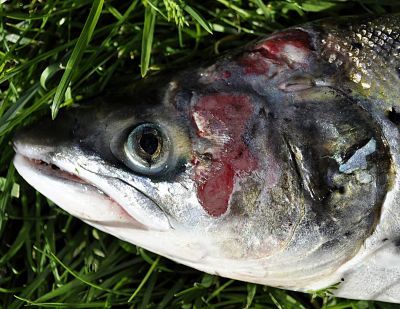Scottish islanders raise a stink over vast salmon graveyard
Industrial quantities of rotting diseased salmon are being ‘dumped in open landfill’, campaigners say

Your support helps us to tell the story
From reproductive rights to climate change to Big Tech, The Independent is on the ground when the story is developing. Whether it's investigating the financials of Elon Musk's pro-Trump PAC or producing our latest documentary, 'The A Word', which shines a light on the American women fighting for reproductive rights, we know how important it is to parse out the facts from the messaging.
At such a critical moment in US history, we need reporters on the ground. Your donation allows us to keep sending journalists to speak to both sides of the story.
The Independent is trusted by Americans across the entire political spectrum. And unlike many other quality news outlets, we choose not to lock Americans out of our reporting and analysis with paywalls. We believe quality journalism should be available to everyone, paid for by those who can afford it.
Your support makes all the difference.Huge quantities of diseased salmon from Scottish fish farms are being dumped in an open landfill on the Western Isles in contravention of environmental guidelines, campaigners have said.
Hundreds of thousands of unprocessed fish are being disposed of on a beach in North Uist by the firm Whiteshore Cockles, according to The Times.
The “secret salmon graveyard” is left to “stink to high heaven”, polluting the air for the local community, environmental activists claim.
In one video released by the group the Scottish Salmon Watch, fish are seen awaiting disposal with blood seeping out of a container near the crofting township of Kyles Paible.
Dan Staniford, the group’s director, said: “The authorities have turned a blind eye to the continued dumping of diseased farmed salmon in landfill at Whiteshore Cockles for well over a decade.
“Scotland’s secret salmon graveyard stinks to high heaven and must be shut down now.”
The paper said Whiteshore Cockles has admitted its methods had caused issues for the islanders.
“The current system of burying the fish waste has one major drawback,” the company wrote to Western Isles council.
“The fish are all kept outside while the burial area is being prepared, and if there is a southwest wind then odours can be prevalent within the local community.
“The pits are covered with several layers of seaweed to allow for the natural regeneration of the ground but again, till the waste has settled, there is always the risk of smells dispersing widely.”
Dead salmon that is dumped in open landfill sites can present a biosecurity risk, according to the animal rights group Peta.
The EU has urged the UK to comply with environmental legislation and raised concerns over the disposal of unprocessed fish in landfills on previous occasions, the paper said.
It said Whiteshore Cockles had been granted a temporary exemption in 2016 by the Scottish government to keep burying fish.
Although the firm’s owner, Angus MacDonald, had promised in 2018 to stop disposing of the carcasses in this method, three years later nothing had yet been done.
He said: “I really don’t want to be burying these fish, believe you me.
“I want to convert them into bio oil which is great for the environment.”
One environmental campaigner, Ewan Kennedy, said it was “extremely concerning” to learn that the diseased fish “dead from viruses” were being buried beneath sand dunes.
“It’s also concerning that post-Brexit there’s no possibility of the UK government facing the threat of enormous fines,” he added.
Western Isles Council said it was aware of the concerns around the facility.
Join our commenting forum
Join thought-provoking conversations, follow other Independent readers and see their replies
Comments